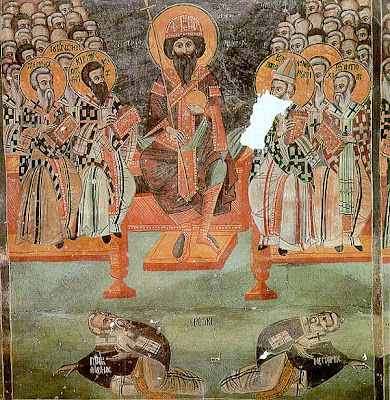I know that this is a very ecumenically incorrect thing to say, since we are accustomed to accepting that the Eastern Orthodox have their own valid way of expressing the fall of Adam and its effects on humanity.
We all know that the Eastern Orthodox are stalwart defenders of the first Seven Ecumenical Councils of the Church. However, two of these Ecumenical Councils (Ephesus in 430 and Nicea II in 787) received the explicitly Augustinian conciliar canons of the Council of Carthage in AD 418.
This Council of Carthage canonized nine beliefs to be received by the Church. These nine statements were put forth to deny the errors of Pelagius. They are as follows:
1. Death came from sin, not man’s physical nature.
2. Infants must be baptized to be cleansed from original sin.
3. Justifying grace covers past sins and helps avoid future sins.
4. The grace of Christ imparts strength and will to act out God’s commandments.
5. No good works can come without God’s grace.
6. We confess we are sinners because it is true, not from humility.
7. The saints ask for forgiveness for their own sins.
8. The saints also confess to be sinners because they are.
9. Children dying without baptism are excluded from both the Kingdom of heaven and eternal life.
Every canon was accepted as a universal belief of the Church and banished all Pelagians from Italy. These Carthaginian canons were accepted by the Church at the Ecumenical Council in AD 431. There were received yet again at the Seventh Ecumenical Council (the Second Council of Nicea) in AD 787.
This occurred when the Seventh Council ratified the Canons of Trullo (also called the Quinsext Council), which had received the Canons of the African Code which include those of the Carthaginian conciliar condemnations of AD 418.
Sooooo…it looks to me that the Eastern Orthodox are bound to accept the nine beliefs put forward by the Council of Carthage of 418, which states that infants much be baptized and “cleansed from original sin.”
I am looking for some solid Orthodox theologians out there to prove me wrong. I’d be happily corrected. But it seems that the Augustinian tradition is not something peculiar to the West, but something canonized by the Conciliar tradition.



Comments Policy: I reserve the right to delete comments that are offensive or off-topic. If your comment contains a hyperlink to another site, your comment automatically goes into "Comments Purgatory" where it waits for release by way of moderation.